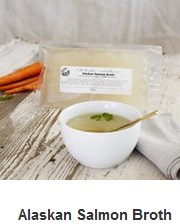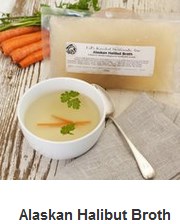- Home
- halibut
Blog Categories
Recent Posts
Salmon and Halibut Fish Broth: An Interview with David Chessik of Alaska Broth Co.
Posted by on
It’s true. Real bone broth, made from pasture raised cows and chickens, is the new/old craze. Beef and chicken broth have gotten plenty of press the last year or two. There was even a feature in the New York Times about New Yorkers sipping broth as part of their morning ritual, like hot tea or coffee. Broth may be new to many Americans, but it’s not new to other cultures. Asians have been sipping broth for centuries, as have generations of native Alaskans.
Wise Choice Market offers real chicken and beef broth, and now we’re the first national distributor to offer high quality wild Alaskan fish broth, made from salmon and halibut. Fish broth is a vegetarian-friendly broth with so many health benefits, you might soon find yourself turning to it instead of beef or chicken bone broth. My interview with David Chessik, founder of Alaska Broth Co, sheds some light on the difference fish broth has made in his life and health.
EW: Why is broth good for you?
David: Bone broth is the buzz and for good reason. The reason is collagen. What is collagen? Collagen is the most prevalent and important protein in your body; the word collagen is ancient Greek for glue, it’s what holds your body together. Collagen is the matrix of your bones that gives them structure, strength, and flexibility; in fact, gram for gram, some expressions of collagen are stronger than steel. Collagen is your joints, connective tissue, ligaments, and cartilage. Collagen is your skin, nails, and hair. Collagen is the teeth’s dentin, the eye’s lens, the inner ear, the vocal cords, the cell’s lattice and the fascia. Collagen makes up about fifty percent of our internal organs.
Collagen is your digestive lining, the lining of veins and arteries, and the blood brain barrier. Collagen is synovial fluid that feeds and maintains your collagen structures, that mineralizes bones, that repairs enamel, that lubricates eyes and joints.
Nevertheless, somehow the modern corporate food suppliers thought that it would be a good idea to replace the collagen rich soups that our grandparents ate with soups that use corn solids and artificial flavorings as a base. Those modern products might taste good, but how does your body get collagen from corn mush? The simple answer is that it can’t.
EW:
Why is the GAPS diet getting so much press?
David: Consequently, there has been a surge in modern chronic diseases that are associated with collagen dependent structures. That generally correlates with the removal of collagen rich food from the modern diet. Prevalent along this line of nutritional reasoning is a disorder called leaky gut, where the digestive lining becomes damaged and allows things into the blood supply that shouldn’t be there.
Many nutritional researchers, including the author of “GAPS,” Natasha McBride, associate a damaged gut lining with autoimmune disorders, allergies and even autism. The GAPS protocol is widely acclaimed as a nutritional approach for repairing the damage that is caused to the digestive lining by a denatured food supply, and collagen rich broths are prominent in this approach. For those who are already using collagen rich chicken and beef broth, marine collagen broths offer a welcome variation.
EW:
What motivated you to come back to Alaska?
David: Natasha’s book, Gut and Psychology Syndrome (GAPS), is what convinced me to bring Alaskan fish broth to market. It’s crazy, in Alaska we throw away hundreds of millions of pounds of valuable marine collagen, and then we import GMO corn mush to feed to our children. That’s unacceptable in light of the health consequences.
I have friends who are raising autistic children, and that’s what motivates me. Eating dead foods is not working out; if it’s for shelf-life, it’s not for your life; if a microbe couldn’t digest it, neither could you.
My interest in collagen rich fish broth also stemmed from my personal need. Somehow, I found myself being a bankruptcy attorney in Las Vegas, getting bigger and bigger. I finally determined that I was going to die before I brought the banks to justice. So I decided to return to my previous life in Alaska where I was a simple fisherman on a remote island and [able] to eat close to nature. Part of eating close to nature came to include broths from salmon and halibut head and spines.
I went to law school later in life because I felt like I was
missing out on all the excitement; and I thought that law school could give me
the power to make a difference, but maybe a person should try to make a difference
closer to where they are. I fought against banking fraud, but there’s more
satisfaction being for something that you love than there is in being against
what you despise. I’m happier being for fish broth, for health, for respecting
the environment and the fish. I was like a fish out of water in Vegas;
sometimes a person has to go out there and get bigger just to realize that they
were good enough all along.
EW:
Is fish broth “better” then beef or chicken broth?
David: I think that it’s good to vary your broths and include moose, beef, and chicken broth in your diet. Give your body a variety of material to work with and then let its innate intelligence decide what to do. Fish broth offers a host of marine minerals, as well as fish oils with their well-documented nutritional benefits, as a bonus. And marine collagen is very easy to digest.
Marine collagen could become another new industry. It could be good for older people because marine collagen is the easiest protein to digest, or for babies since they need collagen to grow their bones and other collagen structures.
In Alaska, they generate 2.2 billion pounds of fish waste a year, and a lot of that could be converted into collagen rich broths. It’s good for the planet, it’s good for the economy, it’s good for people; we reduce the wastefulness and everybody wins.
EW: How has adding broth to your meals helped you get healthy?
David: I include broth as part of my meals every day, and I love it. I’ve lost about 100 pounds and am down to a weight that is perfect for me. My skin rashes have completely gone away, and I don’t struggle with dry eyes. My eyesight has improved, so I don’t use reading glasses anymore. Digestion is very comfortable. Toenails have grown back. Where medication failed, broths and fermented vegetables have worked. I use broth soups and fermented vegetable salads as staples, and avoid sugars and limit all grains.
I’m doing yoga again. When I tried yoga before I’d just get sore, and never more flexible. Now there is no soreness and there is good gain in flexibility. Probably all athletes should think about feeding their connective tissue, and all who suffer from joint stiffness should think about how to get some synovial fluid, think liquid collagen, to the joints.
EW: What do Alaskans eat?
David: Muscle meats have very little collagen protein, just look at how a wild animal eats a salmon. A seal or bear tends to eat the head, and certain organs, the skin, and maybe the meat near the collar; and usually, they discard the fillet. They favor the parts of the fish that are rich in collagen protein, but modern Americans do the opposite. We can learn something by watching how a wild animal eats a fish. They’ve been at a long time; they’ve probably got it figured out.
When Native Alaskans ate a traditional collagen rich diet, they had near perfect dental and bone health. When they started eating a commercial diet, including sugar and processed grains, that changed. Native elders can remember the pot of salmon heads on the wood stove, but for most of the younger Alaskan Natives fish broth is no longer a staple; it’s just something that they’ve tried a few times. Maybe it’s time that we gave more respect to the wisdom of our forefathers, and trusted a little less in corporations.
EW: Who is your partner in your new venture?
David: Daiva grew up in Lithuania, and made broths from fish heads and fins because that’s just what people do there. No one ever heard of anyone in Lithuania who threw away a good fish head without making soup.
When she became a nutritionist and started teaching classes to teach people in Alaska how to make broth, her mother in Lithuania said, “It’s a miracle; there is someone in the world who doesn’t know how to make broth.” Broth has been a part of our culinary traditions for a long time, we have only just recently forgotten.
We started this fish broth adventure last May, at a small fish plant owned by a long- time friend. Wise Choice Market was the first national distributor to see the possibilities in marine collagen broths. Wise Choice Market is making a market for products that are making a difference.
EW: Tell us more about the salmon and halibut broths you and Daiva produce
David: Currently, collagen rich salmon and halibut broths are available. People tend to like the taste of salmon broth more at first, but after a while, about half of the people arrive at liking the halibut broth best.
Our product is lightly flavored and designed to be used as a base, so people should add lemon, onions, greens, pepper, garlic, or hot sauce to taste; or even quinoa and smoked salmon. Use as a broth or for soups. Marine collagen is good for your skin too!
Think you’re ready to try fish broth? Check out the fish broths Daiva and David make. You’ll find them here on Wise Choice Market.
Information provided in this communication is not designed to and does not provide medical advice, professional diagnosis, opinion, treatment or services to you or to any other individual. This is general information for educational purposes only. The information provided is not a substitute for medical or professional care, and you should not use the information in place of a visit, call consultation or the advice of your physician or other healthcare provider. Wise Choice Marketing Inc is not liable or responsible for any advice, course of treatment, diagnosis or any other information, services or product you obtain through Wise Choice Marketing Inc.


 Loading... Please wait...
Loading... Please wait...















